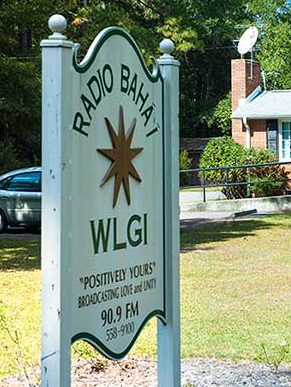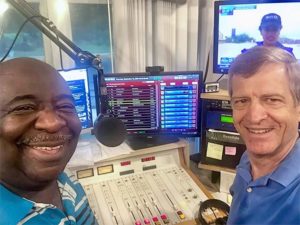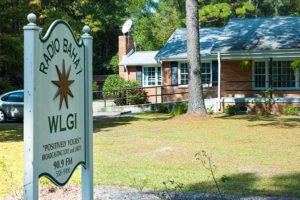



Amid destructive winds and floods from Atlantic hurricanes in the past month, listeners in a largely rural area of northeast South Carolina have clung to Radio Baha’i WLGI 90.9 FM in Hemingway, South Carolina, for up-to-date reports on weather, roads, power outages and more.

The station also has offered something just as life-giving: comfort.
Both services have been particularly vital to a mostly African American area of Georgetown, Williamsburg and Marion counties that other stations generally don’t reach.
“The primary music we play is positive, uplifting, spiritual messages about justice, peace, goodwill toward each other, the oneness of humanity and reliance on God,” reflects Greg Kintz, general manager of the station on the campus of the Louis G. Gregory Baha’i Institute in Hemingway.
“And what we heard from folks was that the music was a real source of calming” — as were the prayers that wafted over the airwaves during Hurricane Florence and the later tropical storm resulting from Hurricane Michael.
“There’s tremendous anxiety that comes with such a storm and flood,” he says, “and I think the positive message we put out on the air had a really strong impact on listeners’ ability to cope.”
Hunkering down during Florence
When Florence swept in from the Atlantic on Sept. 13, WLGI stayed on the air continuously for the first time in such a major storm, thanks partly to a recently installed propane generator and hurricane fabric on the windows of the station’s sturdy brick building.
Ernest Hilton, production manager, and his family stayed hunkered in the studio during the high winds. He ensured that potentially life-saving information was broadcast around the clock, and caught sleep when he could.
“It’s not anything new to me. I’ve done it once before during a hurricane maybe 15 or 20 years ago,” he said during preparations.
But the difference this time was that the station continued its service through the worst weather and the onset of flooding, using a low-power backup transmitter Sept. 13-17 that the generator could support.
That was a timely move, because the hurricane knocked out electrical service soon after they switched to generator power. “We didn’t want to take a chance on our main transmitter being damaged,” says Hilton.
The low-power signal reached an area much smaller than WLGI’s usual 75-mile circle, but many residents of that smaller area didn’t have access to other stations or to the internet.
In addition to the musical programming and Hilton’s periodic reports, the station aired announcements that Kintz compiled and recorded at his home in nearby Conway — with help from volunteers Margene Willis and Ginny Kintz — describing evacuation routes, shelter locations and key phone numbers.
Through an arrangement with South Carolina Educational Television and local TV, WLGI also broadcast 14 news conferences featuring Gov. Henry McMaster, FEMA and county officials.
And, of great importance to listeners deprived of the internet, the station captured Twitter and Facebook announcements from official agencies and reported the information on the air.
Expressions of thanks
Kintz says the station has received many expressions of thanks from officials and listeners. Among them was a woman Kintz’s wife, Ginny, picked up along a country road. Learning of Ginny Kintz’s connection to the station, the woman told how she had been encouraging all her neighbors to rely on WLGI for locally relevant information.


“She was really appreciative, and I had her call Greg while we were in the car to tell him because I knew he had been working so hard,” says Ginny Kintz.
After full power was restored to the main transmitter, WLGI was on the air for the toughest work of all: Helping residents get through the weeks of flooding that followed.
Slow-moving Hurricane Florence had dumped enormous amounts of rain on the area. And as the water ran off into the Great Pee Dee, Little Pee Dee and Waccamaw rivers, they eventually crested several feet above flood stage.
Weeks later, Kintz can report, “houses are just coming clear of water and people are piling debris out at the road. The horrible thing is the smell,” he says, especially as raw sewage and coal ash from breached treatment plants have mixed with floodwaters.
Tropical Storm Michael compounded residents’ misery when it blew through South Carolina on Oct. 11 after wreaking its most severe damage as a hurricane in Florida and Georgia.
“Our area was affected mostly by flooding and road damage, and when Tropical Storm Michael came it just added to the flooding problems,” says Hilton.
A continuing “sense of service”
But mixed into the post-hurricane landscape has been a “sense of service” as well, says Kintz. WLGI and other media outlets regularly provided information on volunteer opportunities, and he knows of people who have joined in relief efforts based on what they heard on the station.
WLGI and the institute are named for a prominent 20th-century African American Baha’i, an attorney and lecturer on issues of racial harmony, whose roots are in South Carolina.
The station moved into its present building in 1998 after operating from a trailer for 15 years. Its programming of spiritually uplifting songs and public service information is intended to contribute to positive social change by providing the communities it serves with access to knowledge those communities have identified as necessary for spiritual, cultural, social and economic development.
Serving people at this time of turmoil in their lives was a natural extension of that mission, says Kintz. “I’m really proud of what we were able to accomplish with the resources available to us — to provide info for people through and after the storm.”
Adds Hilton, “This is our job, keeping our listeners informed as much as possible, and I am glad that we were able to stay on air this hurricane season and do more.”


![]()
![]()
Whether you are exploring the Bahá'í Faith or looking to become an active member, there are various ways you can connect with our community.
Please ensure that all the Required Fields* are completed before submitting.